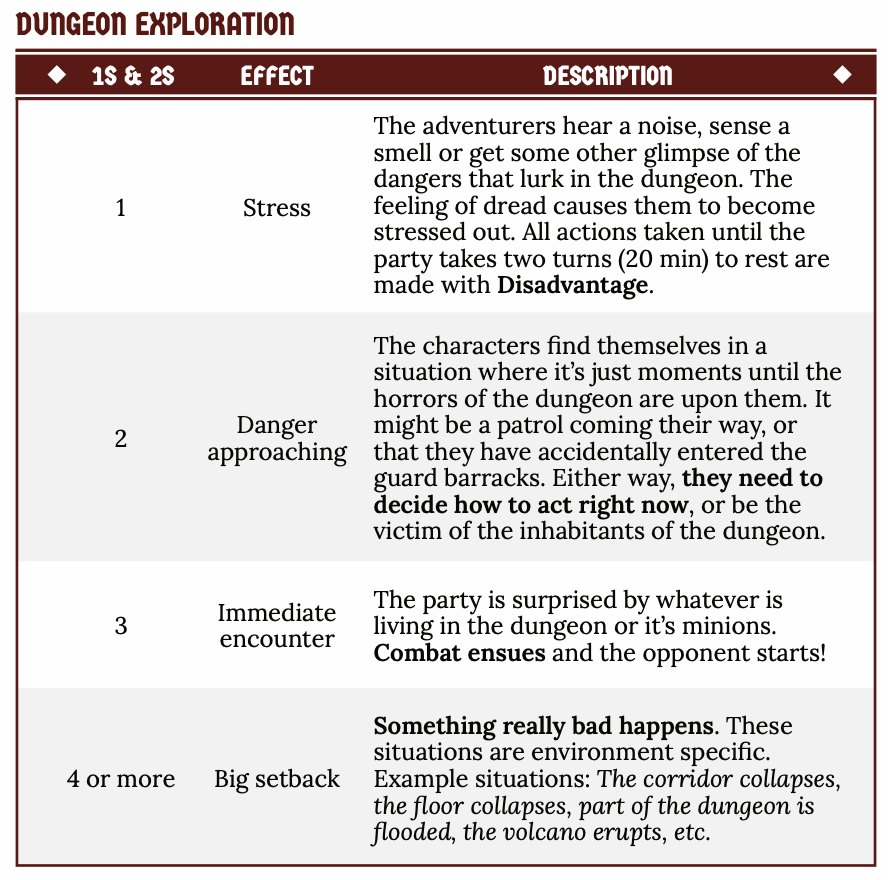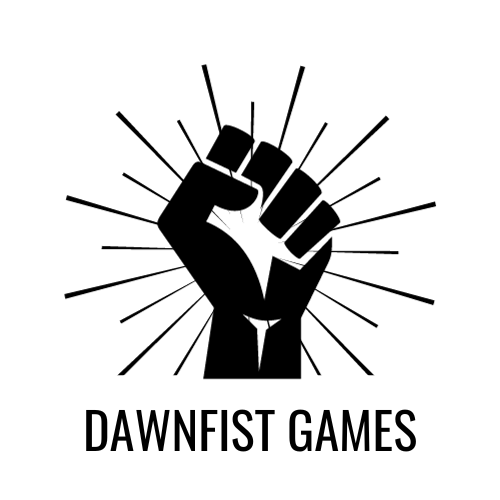Hazard System: is there a better alternative?
The Hazard System, hazard die or Overloaded Encounter Die was originally introduced on the Necropraxis blog back in the early 2010s. The purpose of it is to streamline random encounters and events and handle it with just one single die. Personally I’m all for simplification and making things quick and easy to manage at the table, which should be obvious considering that I created Adventurous. But I don’t really like the hazard die, it’s just not random enough for my taste. Let me explain.
How the Hazard System works
The Hazard System works by assigning an outcome to each number on a D6, meaning that whatever you roll, something happens. The assigned outcomes in the original system are:
- Encounter
- Percept (regarding next encounter)
- Locality (mechanical change in environment)
- Fatigue (take 1 damage unless the next turn is spent resting)
- Resource exhaustion (spell duration, etc.)
- Light source exhaustion (any or all light sources go out)
So for example, if you roll a 5, you pick a spell effect and have that expire, it could be a Protection From Evil spell that loses its effect, or a light spell expiring. If you roll a 6 it means one or all torches burn out, or that a lantern runs out of oil. It’s all pretty smooth, and you know that whatever you roll, something will happen. But that is also partly why I don’t really like it.
The idea is that you roll the hazard die after every significant action taken by the player characters, such as searching a corridor for traps, exploring a large room or picking a complicated lock. That’s pretty often in my book, and if the PCs explore a medium sized dungeon with 10-15 rooms you will roll that D6 probably 10-20 times, so this is where it starts to become troublesome.
Why I don’t like it
A 1 in 6 chance of something happening twice in a row is a bit too common for me, and if you are going to roll the dice 10-20 times during one dungeon, one number is going to come up an unhealthy amount of times, that’s just how dice works. And it doesn’t really matter if that number is 1 or 6, when you roll it for the seventh time in five rooms frustration makes it’s appearance.
Now you might say that it’s just a matter of improvising and rolling with the punches. But we both know how hard it can be to improvise the outcome of a roll for the fourth time that hour. It’s just not user friendly enough and it feels unnecessarily cumbersome for me as the GM, especially when you could just design a more robust system in the first place, without making it much more complicated.
What I prefer instead
It might seem obvious, but I prefer the Adventurous dungeon exploration dice system. Why? Because it has so many advantages, and instead of increasing my workload as the GM it decreases it and makes the game easier to run.
How the Adventurous dungeon exploration system works
Check out my post: Dungeon exploration rules for Adventurous for a full explanation of the system. But the gist of it is that the GM adds a D6 to a pool at the center of the table for every action the PCs make when exploring a dungeon. Each dice represents that 10 minutes have passed, and when 6 dice has been added, an hour has passed and new torches need to be lit.
At the end of an hour, the pool is also rolled, and the GM counts any 1s and 2s and refers to the table below:

This system helps me as a GM with more than just determining if the PCs encounter a group of goblins or if a torch goes or. It automates time tracking and keeps tension high, since the players can see the pool building. It’s very elegant and efficient.
Advantages
- Automatically tracks time, alleviating the GM of one of many tasks
- Less rolling, but without losing tension
- No chance of rolling the same thing two rounds in a row
- It puts clear time pressure on the players
- Time spent in the dungeon is clearly displayed for everyone at the table
Try it out!
You don’t have to be running Adventurous to try the system, it’s system neutral and highly adaptable. So try it in OSE, Mörk Borg or DnD if you like, it will work and it will make your game run smoother while at the same time adding more tension. But if you feel like trying out Adventurous, start with the free quickstart rules, it will give you a great overview of the system and how it works, it’s actually all you need to run your first session.
Closing thoughts
The Hazard System has it’s merits, for one it can also be used for haven play (meaning exploring a friendly settlement) and wilderness exploration, and in those cases I think it works better, because you will be rolling less frequently. But I much prefer a system that reduces the amount of work I have to do while running the game and at the same time helps keep the pressure up on the players.


One Comment